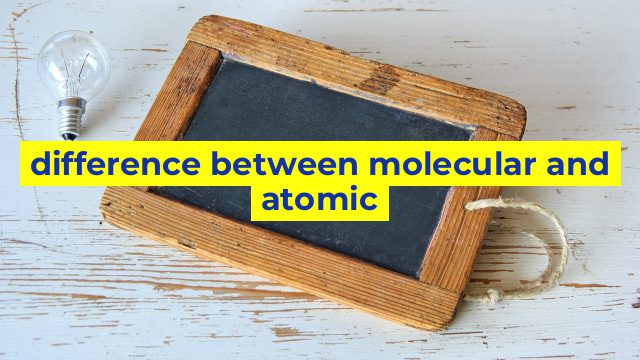The Difference Between Molecular and Atomic
Introduction
Atomic and molecular are two terms that we often hear in the field of chemistry. While both terms are associated with the study of atoms and molecules, they have different meanings and implications. In this article, we will explore the differences between the two concepts.
Atomic
An atom is the smallest unit of an element that retains its chemical properties. The term “atomic” refers to anything that pertains to atoms. Atomic properties include things like atomic number, atomic weight, and atomic radius. An element’s atomic number is the number of protons in each of its atoms. Atomic weight is the sum of the masses of protons and neutrons in an atom’s nucleus. Atomic radius measures the size of an atom based on the distance between its nucleus and the edge of the electron cloud.
Molecular
A molecule is a group of atoms bonded together by sharing electrons. The term “molecular” refers to anything that is related to molecules. Molecular properties include things like molecular weight, molecular formula, and molecular geometry. Molecular weight is the sum of the atomic weights of all the atoms in a molecule. The molecular formula is a representation of the number and types of atoms that make up a molecule. Molecular geometry refers to the spatial arrangement of a molecule’s atoms in three-dimensional space.
Differences
The main difference between atomic and molecular is that atomic properties are related to individual atoms, while molecular properties are related to groups of atoms that are bonded together. Atoms are the basic building blocks of all matter, while molecules are the smallest unit of a compound that retains its chemical properties. Atomic properties are more fundamental in nature, while molecular properties are more specific to compounds.
In conclusion, while atomic and molecular properties are related to the study of atoms and molecules, they have distinct characteristics that differentiate them from each other. Atomic properties are associated with individual atoms, while molecular properties are associated with groups of atoms bonded together. Understanding the difference between these two concepts is crucial in the field of chemistry and helps us understand the behavior of matter at a fundamental level.
Table difference between molecular and atomic
| Category | Atomic | Molecular |
|---|---|---|
| Definition | An atom is the smallest unit of an element that retains the chemical properties of that element. | A molecule is a group of two or more atoms held together by chemical bonds. |
| Composition | Composed of a single type of atom | Composed of two or more different types of atoms |
| Properties | Has unique properties based on its atomic number | Has properties that are determined by the type and arrangement of atoms in the molecule |
| Behavior | Atoms do not typically interact with one another except through chemical reactions | Molecules interact with other molecules through various chemical and physical processes |
| Examples | Hydrogen atom, Oxygen atom, Carbon atom | Water molecule, Carbon dioxide molecule, DNA molecule |


